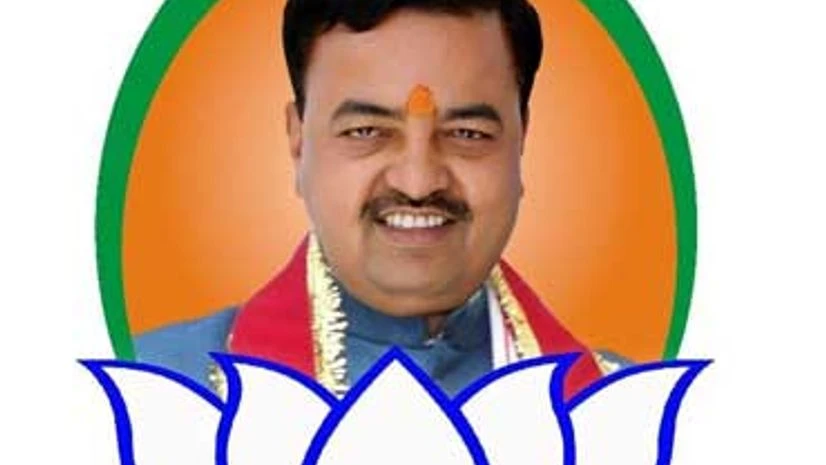The Bharatiya Janata Party (BJP) today appointed new presidents to five of its state units. In all five cases, BJP chief Amit Shah handpicked leaders from dalit, Scheduled Tribes or Other Backward Class (OBC) communities.
The most significant was the appointment of 47-year-old Keshav Prasad Maurya as the chief of BJP's Uttar Pradesh unit.
Announcing the decision on the occasion of the Hindu New Year, BJP General Secretary Arun Singh stressed that Maurya was an OBC from a humble background who in his younger days sold newspapers and tea to support his education.
It was also pointed out that Maurya was a full time worker of the Vishva Hindu Parishad (VHP) for 14-years, was active in the Ram temple movement and went to jail in the cow protection movements.
The choice of Maurya for the difficult job of strengthening the party's organisational structure for the 2017 assembly polls in Uttar Pradesh is indicative of BJP's election strategy for the all important election.
The party hopes to form the government in the most populous state of India after a gap of 14-years on the back of a campaign that is likely to focus on aggressive Hindutva and Prime Minister Narendra Modi's development agenda. It would hope to consolidate its upper caste and non-Yadav OBC votes in the state.
More From This Section
As a foil to Maurya's low profile, it is likely that the BJP might now look for a more well known Brahmin face as its chief ministerial candidate in UP. Brahmins constitute a siseable 10 to 12 per cent of UP's population.
In the 1990s, the BJP had Kalyan Singh, an OBC, as its UP chief minister, while Atal Bihari Vajpayee, a Brahmin, was its national leader. This model is likely to be replicated with Narendra Modi, an OBC leader and MP from Varanasi as the PM, while a Brahmin as its chief ministerial candidate.
In three of the five appointments announced today, BJP replaced a Brahmin with an OBC or a dalit leader. Maurya succeeds current Uttar Pradesh unit president Laxmikant Bajpai.
In Karnataka, the BJP appointed Lingayat leader and former chief minister BS Yeddyurappa as the Karnataka state unit chief in place of Prahlad Joshi. Dalit leader Vijay Kumar Sampla replaced Kamal Sharma as the Punjab unit president.
Former MP Tapir Gao, from a Scheduled Tribe community, was made the Arunachal Pradesh head and K Laxman, also an OBC, will be the new chief of the Telangana state unit. All five outgoing state presidents had completed their three-year terms.
Maurya is a Lok Sabha member from UP's Phulpur constituency, which had for the first three Lok Sabha elections sent Jawaharlal Nehru to Parliament and in later elections sent leaders like Atiq Ahmed who was involved in criminal cases.
In 2014, Maurya defeated former cricketer Mohammad Kaif of the Congress by over three lakh votes to win the seat for the BJP for the first time ever. He had won the 2012 assembly elections from Sirathu constituency in UP's Kaushambi district.
According to Maurya's affidavit to the Election Commission in 2014, he is named in 10 criminal cases, including one of murder. He had declared his personal assets to be worth Rs 9 crore.
Maurya in his profile on the Lok Sabha website declares himself to be a Kushwaha who belong to the Koeri caste. Several non-Yadav OBC communities in UP - Lodhs, Kurmis, Koeris - have traditionally supported the BJP.
Maruya was handpicked from a list of strong contenders that included Swatantra Dev Singh, Dharampal Singh Lodhi and Minister of State for Railways Manoj Sinha.
The return of Yeddyurappa, who had to quit as the Chief Minister of Karnataka under a cloud of corruption charges, is an admission by the BJP central leadership that it can return to power in the state only if it is led by the Lingayat leader. Elections in Karnataka are due in mid-2018. Yeddyurappa is currently the BJP national vice president and a Lok Sabha MP from Shimoga.
Minister of State for Social Justice and Empowerment Vijay Sampla (54), the new Punjab unit chief, will need to quit from the council of ministers. The BJP strictly follows its 'one man one post' principle. Punjab is due for elections alongside UP in early 2017.
Dalits comprise nearly a third of Punjab's electorate. Sampla is an MP from Hoshiarpur. He has also worked as a plumber in Saudi Arabia before joining politics.

)
